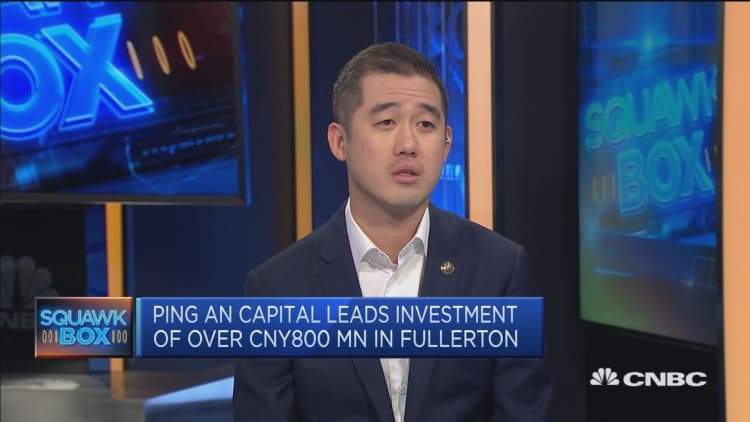, the world's manufacturing powerhouse, is moving toward a more value-add economy and there's one major industry where the country could dominate both as a maker and consumer: health care.
That's because China rocketed into its position as the world's second-largest economy in a matter of decades under a strict one-child policy, contributing to a rapidly aging society with rising medical needs.
According to health-care information company IQVIA, China was the world's second-largest national pharmaceutical market in 2017 — worth $122.6 billion. It was also the biggest emerging market for pharmaceuticals with growth tipped to reach $145 billion to $175 billion by 2022.
"The development of China's healthcare industry is still in its infancy, evidenced by its low healthcare expenditure as a percentage of GDP ... and a smaller proportion of its population aged 60 and over," DBS analysts Mark Kong and Chris Gao said in a recent note. "That implies plenty of room to grow because as the population ages, the demand for medicines will increase."
There's still scope for growth, experts said, even though the Chinese pharmaceutical market's compound annual growth rate from 2013 to 2017 was 9.4 percent.
For comparison, the world's largest health-care consumer, the , splashed $466.6 billion in 2017 and spent $84.8 billion in the same year.
Made in China 2025
China already has ambitions for exporting generic medication. Last year, Chinese pharmaceuticals obtained U.S. Food and Drug Administration approvals for 38 generic drugs, up from 22 such approvals in 2016.
But, as part of Beijing's "Made in China 2025" industry plan, President Xi Jinping identified the pharmaceutical sector as one to push, with the focus on innovation and homegrown research and development.
There's some way to go. China's largest listed pharma, Jiangsu Hengrui, has a market capitalization of $35 billion — about a 10th of Johnson & Johnson's.

This year, at least, will be "promising" with potential new blockbuster therapies expected to be approved in China that will come with affordable price tags, said Credit Suisse in a sector note in January.
As any delay in approval will cause declines in stock prices of the pharma companies involved, Credit Suisse advises investing in bigger names with strong near-term earnings support and new drugs or first-to-market generics in the works.
Here are some of Credit Suisse's Chinese health-care stock picks for 2018:
The Hong Kong-listed company has two blockbuster drugs on its roster — anlotinib for lung cancer and tenofovir for hepatitis B — and a few blockbuster generics aiming for approval before 2021.
Credit Suisse's top pick, Sino Biopharm is already the leader in the Chinese hepatitis medicine market with 22 percent market share in 2016. It also has a complete hepatitis drug portfolio.
The company has more than 10,000 sales representatives in China, with half of them on the hepatitis team — the largest in China, according to Credit Suisse.
In 2016, the company's cancer drug franchise contributed 11 percent to the company's sales. That will increase to 19 percent by 2020 after anlotinib is launched in the first quarter of 2018, said Credit Suisse. The product is likely to be competitive versus comparable drugs from multinationals, the bank added.
Jiangsu Hengrui is the largest listed pharma in China. And, with industry consolidation in the cards due to government-led changes, it will be the best positioned to ride out that trend, said Credit Suisse.
That's due, the bank said, to Jiangsu Hengrui's effective drug portfolio, strong capacity in delivering products in the pipeline, its leading position in cancer treatment and a well-established sales team.
The pharmaceutical firm is set to launch three blockbuster drugs in 2018, two of which are proprietary cancer drugs. The last is a generic product for respiratory conditions.
Hong Kong-listed CSPC is poised for near-term profitability and the strongest organic growth among large pharmaceutical names, the Swiss bank said.
Inclusion of an injection used in stroke and cancer treatment under China's health-care reimbursement system will help drive growth, Credit Suisse added.




